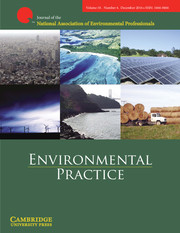As I write this piece in early August, the joys of summer in the Pacific Northwest are all around. I sit with a flannel shirt and wonder if it will get into the 70s today, even though last week's newspapers rattled on about 100-degree weather and oppressive humidity for most Americans. Climate change and global warming seem very far away.
About two months ago, however, I saw Al Gore's An Inconvenient Truth, a movie that I strongly recommend every person see, especially environmental professionals. This 100-minute film has only two characters: our planet Earth and our former Vice President (and, as he notes, the Former Future President of the United States). Once seen, the challenges of climate change will be with you permanently. Gore demonstrates the power of visuals and a coherent message to persuade, even when the conclusions are not happy.
Before I proceed further, I'll address the question of the film's scientific accuracy. Gore maintains that climate scientists agree with the conclusion that humans are causing climate instability that is likely to be harmful, primarily through emissions of gases such as carbon dioxide.
What do “real scientists” think about Gore's use of science? To judge by the review on the Web site RealClimate, Mr. Gore did very well on his homework.1
RealClimate, 2006, “Climate Science from Climate Scientists,” http://www.realclimate.org, accessed August 4.
E. Steig, 2006, “Review of An Inconvenient Truth,” May 10, http://www.realclimate.org, accessed August 4.
To be sure, skeptics of climate change can still be found; see, for example, the Web site JunkScience.com.3
JunkScience.com, 2006, “All the Junk That's Fit to Debunk,” http://www.junkscience.com, accessed August 4.
If the climate scientists are producing important information and Al Gore has captured it accurately, then what should environmental professionals be doing? More to the point, how will climate change affect the work of environmental professionals? In many ways, the readers of this journal will be affected, possibly severely. Consider a few examples.
Suppose you are a NEPA (National Environmental Policy Act) practitioner working on an environmental assessment of a new major highway project. In the scoping effort, should the extra carbon dioxide emissions, which a major highway will encourage or enable, be part of the assessment? In the alternatives assessment, should mass transit emitting lower carbon dioxide per passenger mile be included? Will the courts eventually decide that emissions of carbon dioxide should be assessed for this kind of project? Do you have the tools that will enable you to efficiently include these new factors?
Suppose instead that you are a land manager with the US Forest Service, the US National Park Service, or the US Department of Defense. In your projections, have you tried to include the effects of climate change? What does science say about how land under your management may change? If, for example, you manage land in Glacier National Park, how will an absence of glaciers affect your work?
Another example: suppose you are an urban and regional planner in the State of Florida or New York City. Is your master plan updated to include the effects of a 20-foot rise in sea level that may stem from melting of the ice on Greenland and Antarctica? An Inconvenient Truth had extremely effective graphics that showed maps of Florida and New York City before and after such a rise in sea level. Only the building of the most massive levee systems ever imagined will keep southern Florida and much of New York City from submersion if sea levels rise 20 feet. And how might you write an environmental impact statement for this system?
Consider a final example: suppose you help private companies prepare environmental management systems. Have you assessed your clients' emissions of carbon dioxide and other climate-altering gases? How will your clients alter their standard procedures if the climate grows warmer? What if the sea level rises? If climate change effects are not part of the environmental management system, is it professionally sound?
To be sure, the above four scenarios are hypothetical, but they raise issues that have a basis in science. Without paying attention to the science, one is simply hoping for good luck, especially when the scientific information is so readily available. Former Vice President Gore reminds us that the truth can be inconvenient. Responsible professionals cannot avert their eyes and hope the problem goes away.
These considerations raise two important issues for the National Association for Environmental Professionals. First, what does our Code of Ethics require of us in our profession and as an organization? Second, what should Environmental Practice publish to help the NAEP take a leadership role in climate affairs? We welcome your input.



